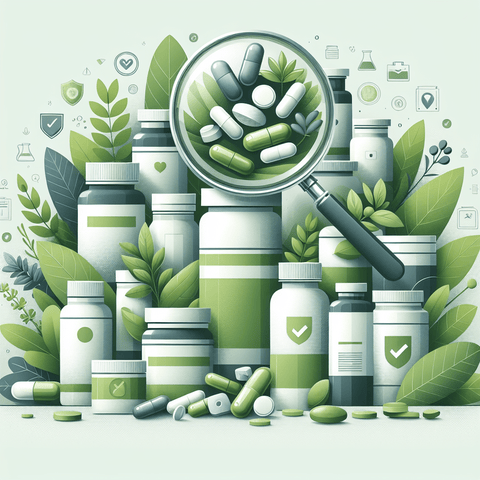Over-the-counter (OTC) supplements have become an integral part of modern health and wellness routines. From boosting immunity to improving energy levels, millions of individuals rely on these products daily. The convenience of purchasing supplements without a prescription, coupled with the perception that natural equals safe, has propelled the industry to new heights. Yet, despite their popularity, there exists a substantial gap between public perception, medical guidance, and the hidden truths lurking behind the labels and marketing claims of many OTC supplements. This comprehensive guide aims to unveil these truths, helping you make more informed choices and safeguard your health.
Over-the-Counter Supplements: What Are They and Why Do We Use Them?
Over-the-counter supplements are products intended to supplement the diet that contain one or more dietary ingredients such as vitamins, minerals, herbs, amino acids, or other substances that may enhance health. They are generally classified under dietary supplements and are regulated differently from pharmaceuticals. Common types include vitamin and mineral formulations, herbal extracts, amino acids, enzymes, and specialty blends designed to target specific health concerns.
People turn to OTC supplements for various reasons. Some seek to fill nutritional gaps in their diet, aiming to prevent deficiencies or boost overall health. Others are influenced by wellness trends, marketing, or the desire for self-managed health improvements. The appeal of convenience and perceived safety also plays a vital role. For example, many consumers choose vitamin C to support immune health, or magnesium for muscle and nerve function, often trusting these natural options over pharmaceutical medications.
The market for OTC supplements is expansive. According to recent estimates, the global dietary supplements market continues to grow annually, driven by increased health awareness, aging populations, and a shift toward preventative healthcare. This growth indicates a rising consumer confidence in these products, often with limited awareness of the underlying science, ingredients, and regulatory oversight.
However, while OTC supplements are accessible and often marketed as safe and natural, their actual safety and efficacy can vary widely. Without proper guidance, consumers risk misusing these products, which can lead to health complications. Understanding what’s in your supplements, their intended effects, and the potential risks is essential for responsible consumption and optimal health outcomes.
Natural Supplement Misconceptions: Separating Fact from Fiction
The phrase "natural" is often used as a marketing buzzword, implying safety and effectiveness. Many believe that all natural supplements are inherently safe, but this misconception can be dangerous. Nature is a complex arena; some plants and substances contain toxins or contaminants that can harm you, especially if consumed in high doses or if you have sensitivities. For example, certain herbal extracts like comfrey or belladonna are natural but can be toxic if not processed correctly.
Similarly, the assumption that herbal or natural supplements are always superior to pharmaceuticals is flawed. While some natural compounds do have scientifically supported benefits, others lack rigorous evidence or can interact negatively with medications. The potency of herbal supplements can vary significantly between brands and batches. Many natural products contain active ingredients at levels that require careful standardization and dosage guidance, which is often missing in OTC products.
Another widespread misconception is that natural supplements are unregulated or free from quality control issues. In reality, herbal supplements are regulated as food products or dietary ingredients, not drugs. This means that standards for purity, potency, and safety are less stringent, leading to variability in product quality. Contamination with heavy metals, pesticides, or synthetic pharmaceuticals has been documented in some herbal supplements.
To navigate these misconceptions, consumers should look for scientific research backing the ingredients, choose products from reputable brands, and look for third-party testing and certification. It’s vital to remember that "natural" does not automatically mean safe or effective. Being an informed consumer involves scrutinizing product labels, researching ingredients, and consulting healthcare professionals, especially when dealing with chronic health issues or medication use.
OTC Supplement Safety Tips: Protecting Yourself While Reaping Benefits
Prioritizing safety is crucial when incorporating OTC supplements into your routine. A simple but essential step is consulting healthcare professionals before starting any new supplement, especially if you have underlying health conditions or take prescription medications. Healthcare providers can advise on the appropriateness, dosage, and potential interactions, helping you avoid adverse effects or ineffective use.
Understanding recommended dosages is vital. Megadoses of certain vitamins can be harmful—for example, excessive vitamin A or vitamin D intake can lead to toxicity or imbalances. Always adhere to dosing instructions provided on the label or by your healthcare provider. Remember, more is not necessarily better, and exceeding safe limits increases the risk of toxicity.
Drug-supplement interactions are a significant safety concern. Supplements like herbal products may alter the effectiveness of medications, interfere with blood clotting, or exacerbate health issues. For instance, herbal supplements like ginseng or St. John’s Wort can impact blood sugar levels or interfere with antidepressants. Being transparent with your healthcare provider about all supplements you take is essential for safe management.
Monitoring your response to supplements is equally important. Pay attention to any adverse effects such as allergic reactions, gastrointestinal disturbances, or changes in symptoms. If you notice any negative signs, discontinue use and seek medical advice promptly. Maintaining a supplement journal can help track your health response over time and provide useful information during medical consultations.
Choosing reputable brands is another key safety tip. Look for products with transparent ingredient lists, clear manufacturing and expiry dates, and third-party testing certifications. Purchasing from trusted vendors reduces the risk of buying contaminated or mislabeled products. Additionally, staying informed about recalls, warnings, or regulatory alerts related to specific supplements can help you avoid potentially dangerous products.
Finally, always consider the importance of a holistic approach—supplements should complement, not replace, a balanced diet, regular physical activity, and overall healthy lifestyle choices.
Hidden Ingredients in Supplements: What's Really in Your Bottle?
One of the less obvious, yet most concerning, issues with OTC supplements involves hidden ingredients. Many products contain undisclosed fillers, binders, artificial preservatives, or synthetic additives designed to improve shelf life or appearance but can pose health risks. For example, certain herbal supplements might include artificial colors or flavorings that some individuals prefer to avoid.
More worrying is the presence of undeclared pharmaceuticals or contaminants. The black market and unregulated manufacturing environments can lead to adulterated products containing synthetic drugs or banned substances, which may cause serious health risks or legal complications, especially for athletes subject to doping rules.
Additionally, some supplements may contain synthetic compounds that mimic natural ingredients, but are chemically engineered—sometimes without disclosure. These substances can have unpredictable effects and pose unknown health hazards. Undetected allergens or banned substances can also be present, risking allergic reactions or failing drug tests.
To protect yourself, identify products from brands that conduct third-party testing and hold certifications from reputable organizations. Reading customer reviews and checking for transparency in ingredient sourcing can also help. Being vigilant about possible adverse effects and consulting with healthcare professionals before starting new products is vital, particularly if you have sensitivities or allergies.
Unsupervised Supplement Use: Risks of Self-Medication and Lack of Medical Guidance
Self-prescribing supplements without medical advice can have serious health implications. While OTC products seem harmless, improper use, overuse, or interactions with medications can lead to toxicity or mask underlying health issues. Fat-soluble vitamins like A, D, E, and K accumulate in the body, and excess intake over time can lead to toxicity, hepatic damage, or other health problems.
Moreover, supplement use may mask symptoms of an underlying disease, delaying diagnosis and appropriate treatment. For example, taking high doses of certain vitamins may temporarily alleviate symptoms but not address the root cause, leading to worsening health if the situation is ignored.
Interactions with medications can also be dangerous. For instance, supplements like vitamin K can interfere with blood-thinning medications, increasing the risk of clotting or bleeding. Herbal products like ginseng or St. John’s Wort can alter the metabolism of prescription drugs, affecting their efficacy. In some cases, supplement misuse has resulted in hospitalizations or adverse events.
Responsible use involves consulting healthcare providers, especially when managing chronic conditions or taking multiple medications. Educating yourself about the proper dosages, possible interactions, and potential side effects reduces risks. Always read labels carefully, and if uncertain, seek professional guidance to ensure your supplement strategy enhances rather than endangers your health.
OTC Supplement Regulations: Navigating the Legal Landscape
Regulatory oversight of OTC supplements varies by country but generally involves multiple agencies tasked with ensuring safety and truthful marketing. In the United States, the Food and Drug Administration (FDA) regulates dietary supplements under the Dietary Supplement Health and Education Act (DSHEA). Unlike pharmaceuticals, supplements are not approved by the FDA before they reach the market. Instead, manufacturers are responsible for ensuring product safety and truthful labeling, with the FDA taking action only after products are proven unsafe.
The Federal Trade Commission (FTC) monitors advertising and marketing claims, aiming to prevent false or misleading information. Despite these regulations, loopholes and limited oversight mean that many supplements enter the market with exaggerated claims or undisclosed ingredients. Consumers should interpret marketing assertions cautiously and rely on scientific evidence and third-party certifications.
Labeling is another critical aspect. Legally, supplement labels can make structure/function claims but cannot claim to treat or prevent specific diseases unless approved as drugs. However, some products blur these lines, leading to misconceptions about their effectiveness.
Although laws have improved over time, the current regulatory landscape does not guarantee absolute safety. Advocacy for stricter regulations and transparency continues, but as consumers, staying informed about regulatory limitations and choosing products from reputable sources remains vital.
Conclusion
The world of OTC supplements is complex, often filled with misconceptions, hidden ingredients, and regulatory gaps. While many products can support health, misguided reliance, improper use, and lack of awareness can pose significant risks. The key to safe and effective supplementation is education, vigilance, and consulting healthcare professionals. Be skeptical of marketing hype, seek third-party verification, and prioritize reputable brands. Remember, supplements should be part of a balanced lifestyle—not a substitute for proper diet and medical care.
Empower yourself with knowledge about what you’re taking, ask questions, and stay vigilant. The hidden truths behind OTC supplements are not meant to scare but to inform, ensuring that your health decisions are made with confidence and care.
Q&A Section
Q: Are all natural supplements safe to take?
A: Not necessarily. While many natural supplements are safe when used appropriately, some can be toxic, contain contaminants, or interact negatively with medications. Always research ingredients, verify quality through trusted sources, and consult healthcare professionals before use.
Q: How can I tell if a supplement contains hidden or undeclared ingredients?
A: Look for products certified by third-party organizations. Research brands and avoid products with vague ingredient lists or those from untrusted sources. Staying informed via reviews and regulatory notices can help identify potential issues.
Q: Why is it dangerous to self-prescribe supplements without medical advice?
A: Self-prescription may lead to overdosing, harmful interactions with medications, or masking underlying health conditions. Consulting healthcare providers ensures the safe and appropriate use of supplements tailored to your individual needs.
Q: What should I consider when choosing OTC supplements?
A: Ensure the product is from a reputable brand, has transparent ingredient labeling, and is third-party tested. Follow recommended dosages, and seek professional advice if you have health concerns or are on medication.
Q: Are OTC supplements regulated by the government?
A: Regulations vary by country. In the US, dietary supplements are regulated under DSHEA, which means they are not approved before marketing. It’s important to choose products carefully and rely on third-party testing for assurance of safety and quality.
Important Keywords
- Over-the-counter supplements
- Supplements safety
- Natural supplements
- Supplement regulation
- Supplement ingredients
- Drug-supplement interactions
- Herbal supplements
- Third-party testing
- Supplement quality control
- Vitamins and minerals



